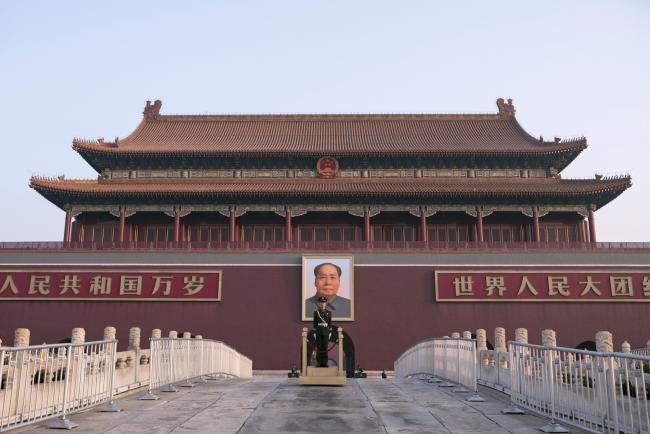(Bloomberg) -- Faced with the question of whether China will really change the way it does business, U.S. officials have sounded a refrain familiar to people who have negotiated with Beijing: We’ve got allies on the inside.
“You have to start with the proposition that there are people in China who believe that reform is a good idea,” U.S. Trade Representative Robert Lighthizer told NPR on March 25, in one of several similar recent remarks. “And you have to believe that those people are at a very senior level.”
Problem is, U.S. officials and executives have been hearing the same Chinese promises for decades, only to find themselves staring at the increasingly lopsided trade relationship that President Donald Trump says he wants to correct. While China long ago opened its markets to foreign goods and investment in the name of “reform,” solidifying state control and local dominance over key industries remain central themes of Communist Party policy.
That’s been especially true since Chinese President Xi Jinping came to power in 2012, leading a resurgence of party influence over everything from corporate boards to universities and houses of worship. China’s most powerful leader since Mao Zedong has only consolidated control over state-owned enterprises and strategic technology sectors, despite promoting perceived economic reformers, such as top trade negotiator, Vice Premier Liu He.
‘Bold Gamble’
“It’s a bold gamble to try to empower the reformers this late in the Xi Jinping administration, when so far the hawks have been so dominant,” said Michael Pillsbury, a senior fellow at the Hudson Institute in Washington and a Trump adviser known for his critical view of China. “It may be the best chance we have other than a new cold war or surrender.”
The proof may come soon enough, with Liu meeting U.S. officials in Washington this week with the aim of finalizing a deal between Trump and Xi and ending their year-long trade dispute. The talks have again pit the U.S.’s idea of “reform” -- changes that level the playing field for private companies and foreign investors -- against China’s preference to use markets selectively to strengthen domestic industries and complete the country’s path toward development.
Lighthizer has given no names for those he ranks among China’s reformers, saying only that they know protecting intellectual property and stopping forced technology transfers would help their country. Besides Liu, figures widely seen as economic reformers include People’s Bank of China Governor Yi Gang, who’s helping overhaul China’s financial regulation, and Vice President Wang Qishan, who defended globalization and multilaterism this year at the World Economic Forum in Davos, Switzerland.
Over the decades, the U.S. has built relationships with such reformers only to find their efforts to reach common ground frustrated. That’s led some Americans to theorize that trade negotiators in Beijing deliberately portray themselves as embattled reformers to get the U.S. to relax its demands.
“China has been successful in convincing American negotiators to dial back their demands and reduce their pressure, lest they disempower the reformers and give the hardliners ammunition,” said James McGregor, China chairman of APCO Worldwide, which advises foreign companies. “This is one of the most effective tools in China’s negotiating toolbox. They know that the West has all along wanted China to reform and be more like us.”
As early as 1985, a RAND Corp. study on Chinese negotiation tactics commissioned by the U.S. government argued that party officials “may urge a foreign negotiator to accommodate to their position using the argument that if he does not, his ‘friends’ in the PRC leadership will be weakened by failure to reach agreement.”
Conflicting Definitions
Part of the problem may be differing definitions of reform. In an 80-minute speech celebrating the 40th anniversary of former leader Deng Xiaoping’s “Reform and Opening Up” in December, Xi offered no new policies that might assuage investor concerns about market access or the slowing economy. Instead, he reaffirmed the party’s dominance and its pursuit of “indigenous innovation” in “core technologies.”
For the U.S., reforms are specific and enforceable changes that move China toward policies in line with other developed economies. In the current talks, the Trump administration is demanding commitments to protect intellectual property, allow equal market access and prevent competitive devaluation of the yuan, among others.
“Reform in the Chinese context simply means ‘change’ towards a desired outcome,” Jude Blanchette, China practice lead at Crumpton Group in Arlington, Virginia, and a former Conference Board researcher in Beijing. “This could mean strengthening state-owned enterprises just as easily as it could mean ending capital controls.”
Little Influence
Former officials have also recently voiced positions that are appealing to the U.S., though they don’t yield any influence on the current negotiations. Long Yongtu, who negotiated China’s entry into the World Trade Organization, said last week that the trade friction could be healthy for the country while former PBOC Governor Zhou Xiaochuan, who fought to make the yuan more freely traded, said that a good result would be good for the world.
Former Chinese Finance Minister Lou Jiwei last month dismissed Made in China 2025 -- the industrial blueprint that has drawn much of the Trump administration’s ire -- as a “waste of taxpayers’ money” and said the government should have let the market decide which industries get resources.
“The fact that reform voices can be heard at all right now is both surprising and significant,” said Leland Miller, chief executive officer of China Beige Book, an economics consulting firm. “But are they driving policy, even a little bit? Sure doesn’t seem that way.”
